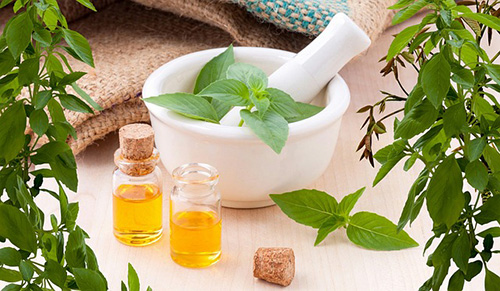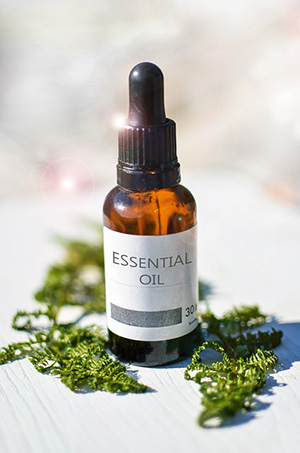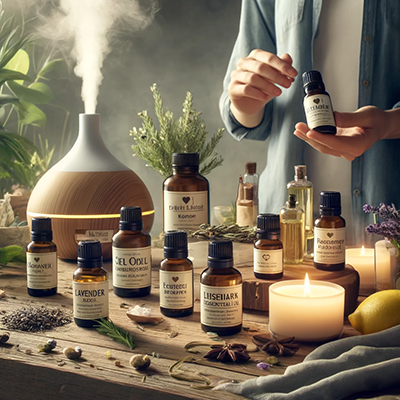Contents

Before discussing the top essential oils for high cholesterol, let’s learn more about this condition. High cholesterol may cause several health issues, such as peripheral artery disease, heart disease, and stroke. Plant-based essential oils have been used in many cultures for centuries to cure various diseases.
Essential oils are fragrant substances that are obtained from plants. They have been used for many different medical ailments for many years in traditional medicine, aromatherapy, and other therapeutic techniques. The characteristics of specific essential oils may have potential advantages for heart health even if they are not a direct therapy for high cholesterol. Here is a look at how they could be helpful:

1. Antioxidant Properties: Oxidative stress significantly influences cardiovascular disorders. Low-density lipoprotein (LDL) cholesterol may be oxidized by free radicals, which increases the likelihood that it will adhere to arterial walls and form plaques, a disease known as atherosclerosis.
2. Anti-inflammatory Effects: Chronic inflammation also influences cardiovascular disorders. Essential oils may benefit heart health by lowering inflammation.
3. Stress Reduction: Chronic stress increases the risk of heart disease and raises bad cholesterol. Essential oils can help with relaxation and stress relief.
4. Improved Circulation: Some essential oils improve blood circulation. The development of cholesterol and other chemicals on arterial walls may be avoided with improved circulation.
5. Direct Impact on Cholesterol Levels: Research shows that specific essential oil elements may directly impact cholesterol metabolism.

6. Supporting Healthy Lifestyle Choices: Aromatherapy may help create a calm atmosphere suitable for relaxation techniques like yoga or meditation. These actions, necessary for controlling cholesterol, may result in a better lifestyle.
7. Cautions and Considerations: Essential oils should not be used instead of regular medical treatments for excessive cholesterol or cardiovascular illnesses. Although they may support medical experts’ recommended drugs, dietary modifications, and other therapies, they cannot replace them.
8. Potential Allergies and Sensitivities: Some people could be sensitive or allergic to specific essential oils. Before using any oil topically, a patch test must be performed.
9. Safe Use: Essential oils should always be diluted in a carrier oil beforehand being used topically to prevent skin irritation. One should first speak with a healthcare provider before ingesting (only certain oils in small quantities). It’s crucial to utilize essential oils with prudence and in combination with conventional medical treatments, even if they may have advantages that indirectly promote heart health. Always seek medical advice before adopting any new therapy into your health routine.
Top Essential Oils for High Cholesterol
According to some studies, certain essential oils may be helpful for people with high cholesterol by improving general heart health or inducing relaxation, which may reduce stress—a recognized risk factor for heart disease—and help people relax. Here are some of the best essential oils to consider if you have high cholesterol.
Disclaimer: It’s important to remember that essential oils cannot replace dietary and lifestyle modifications advised by healthcare experts, prescription cholesterol-lowering drugs, or essential oils.
Lavender Oil
Most commonly recognized for its relaxing effects, lavender oil may not immediately decrease cholesterol, but its stress-relieving benefits may help. Ongoing stress is believed to exacerbate heart disease.
Lemon Oil
Limonene, a substance with antioxidant qualities, may be found in lemon essential oil. It may help lower oxidative stress, which contributes to heart disease. Although there is no concrete study connecting lemon oil to lowering cholesterol, some people also think it may aid in the body’s detoxification process.
Rosemary Oil
Rosemary oil, which is high in antioxidants, may fight the body’s free radicals, which are connected to heart disease. According to specific research, rosemary oil may enhance circulation, essential for heart health.
Cypress Oil
Since cypress essential oil is known to increase blood flow, it may benefit heart health. Improved circulation makes the heart work less, decreasing the risk of hypertension and cardiovascular issues.
Ginger Oil
Ginger contains anti-inflammatory qualities that may be good for the heart. According to research in Food & Function, ginger’s natural components may help lower blood triglycerides and LDL cholesterol.
Bergamot Oil
Bergamot oil, a mainstay of traditional Chinese medicine, includes polyphenols that have been shown to lower cholesterol and enhance heart health. According to specific research, bergamot may considerably cut LDL (bad cholesterol) readings while increasing HDL (good cholesterol).
Garlic Oil
Garlic offers significant heart-health advantages despite not being used as often in aromatherapy as some other oils on this list. Garlic is known for lowering LDL cholesterol levels and preventing atherosclerosis (hardening of the arteries). Although garlic supplements are often used for these advantages, garlic oil may also be considered.
Additionally, it’s important to use pure, high-quality essential oils and apply them topically or by inhalation (diffusion) as instructed while utilizing them (when appropriately diluted with a carrier oil). Remember that although they won’t be a magic fix for high cholesterol, they might help preserve general health and well-being.
Even though essential oils may have supporting effects, they should not be utilized as the only form of therapy.
Health Disclaimer: The information on this website is for educational uses only and is not a substitute for professional medical advice. Always consult an authorized healthcare provider for any health concerns before using any herbal or natural remedy. We do not establish, treat, cure, or prevent any disease. Reliance on any material from this website is solely at your own risk. We are not responsible for any adverse effects resulting from the use of information or products mentioned on this website.
References
- PubMed: https://pubmed.ncbi.nlm.nih.gov
- National Center for Complementary and Integrative Health (NCCIH)
- National Association for Holistic Aromatherapy (NAHA): https://www.naha.org
